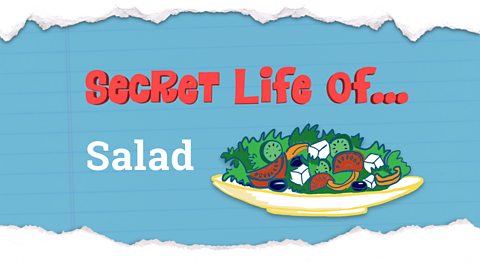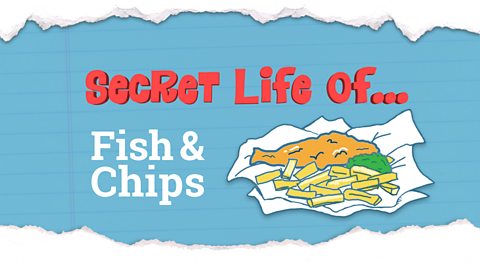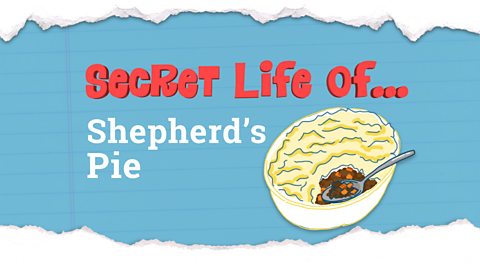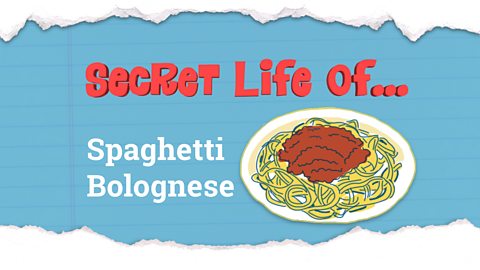Female 1 (VO):
Chicken curry.
Stefan Gates:
Now, curry is one of those dishes that you either love or hate. I love it. And I love it because of the exotic flavours from the spices, and I love the fiery heat from the chilli that makes my brain tingle. But what I love most is that it's got an amazing story behind it. This is a dish so important that continents were discovered in search of its ingredients - seriously. Columbus reached the Americas in 1492 in search of spices. Now, when he was there, he discovered these fellas: vanilla, and chilli. Before then, these simply weren't known in Europe. Now, much later, terrifying battles were fought between the Dutch, the Spanish, the Portuguese and the English, over these: nutmeg and cloves. Now, they don't look much, but they were incredibly valuable Question is: what was all the fuss about?
The word curry comes from the Indian word kari, which just means spiced sauce. I think there's a kind of magic to it. You combine your spices and your fry them to release their funky fragrance and full-on flavour. Then, give 'em a good old crush to get even more of those flavours flying around.
Now we're bringing out the big guns. These fellas are chillies, and they're packed full of this amazing chemical called capsaicin. And what it does is it fools the heat receptors on your tongue to think that there's a fire burning in your mouth. Now, it can feel a little bit painful, but I absolutely love it.
Now, the trouble with this cheeky capsaicin stuff is it doesn't dissolve in water. Seriously, a glassful of the stuff will never truly ease your chilli pain. But it does dissolve in fat, so you need a drink that contains some fat like nice, cold, ice-cold milk to bring sweet relief.
Oh-hoo! That's better. [GASPS] Don't try that at home. Now, on with the curry. Our next ingredient is actually a fruit.
Tomatoes. Yes, technically a fruit because it grows from the flower of the plant. Not sure I'd eat it with my ice cream though Tomatoes don't like too much rain and they hate getting cold, so they're usually grown in greenhouses. And this is a huge greenhouse where they grow tomatoes in all shapes and sizes, with name that sound like other foods completely: plum, cherry, and even beef The tomatoes caught on in Britain only about about 200 years ago. They originally grew in South America and it was the Spanish explorers that brought them back to Europe. Ole! Yeah. Actually, the first tomatoes in Europe may've been yellow. They were written about as [FOREIGN DIALOGUE] , which means golden apple. You see, see? Definitely a fruit Unless heated, greenhouses get too cold in Britain to grow tomatoes all year round. So we grow loads when the sun is shining, and then freeze them or put them in cans for use over the winter.
There we go, tomatoes are in. But this is a chicken curry, so we need some chicken. Here we go. Now, the first thing we're gonna do with this chicken is brown it off Now, the reason that we do this is because there's a magical chemical reaction that's happening inside there. The chicken's got these two chemicals in. One's called an amino acid, the other's called a carbohydrate. And when you put really, really high heat on them, like this, and you start to fry them, those two chemicals combine to create another compound which is an amazing savoury flavour. And you can probably see it already just starting there. A little bit of browning going on there, and that is where the magical taste is beginning. And it's something called the Maillard effect. It's an incredibly complex set of chemical reactions, but every time you cook food, and every time you brown meat and fish, that's what you're doing. You're creating the Maillard reaction, and it's why food tastes great. Chefs love this stuff.
This is a chicken farm in Wales. They're free range, which means they like to let their chickens get out and roam free rather than being cooped up all day.
Gareth Williams:
Our chickens are bred for meat for the table. And then there's other chickens which are bread for eggs. They come here as day-olds, and they leave the farm at 11 weeks. We try and farm them as naturally as we can, and that means we open the door in the morning, we let the chickens come out into the field where they can roam around.
Stefan Gates:
Gareth feeds the chickens a mixture of these special food pellets and oats. It adds to the flavour of the chicken when it's cooked. But that's not all they eat.
Gareth Williams:
When we let the chickens out, they forage on the field, picking up clover and berries and nuts and insects.
Chicken poo is very good for the ground, for the soil, for growing plants, 'cause the food is so natural and it's got lots of goodness in it. It comes through the chicken and the chicken poo is good for growing plants and vegetables.
Stefan Gates:
So, after they feed on the land, the chicken poo helps the land grow more food fo the chickens to eat again. And it goes on, and on, and on, and on and on and on and on and on.
So, why do I love curry? Well, it's got some amazing science, some amazing history, some exotic flavours and some bizarre sensations. It's like a whole adventure on a plate.
Video summary
Images, practical cooking demonstration and commentary explains where each of the component ingredients for a traditional chicken curry comes from, where it is grown, why it is used and what it adds to the dish.
Every ingredient has a function.
It explores the roots of the dish from the Indian ÔÇÿKariÔÇÖ and the importance and value of spices throughout history.
It shows how to crush and fry spices to release the flavour and fragrance.
It explains how the chemical capsaicin makes chillies set our mouth on fire and why milk will cool the mouth down.
Close-up views are shown of mass controlled production of tomatoes in greenhouses, and explain their seasonality and how we use canned tomatoes in the winter.
To explore the chicken we visit a farm in Wales and see what is meant by free range.
In cooking chicken, the Maillard reaction is also explained.
This clip is from the series The Secret Life of Our Favourite Dishes.
Teacher Notes
Pupils could make the dish shown in small groups.
Pupils could be shown whole and crushed spices.
They can smell different spices and see if they can guess what they are or what they are used for (cinnamon, nutmeg and coriander are good for this).
They could taste some prepared curry dishes, exploring what ingredients have been used.
Pupils could design a curry for a particular occasion or personÔÇÖs needs, for example, a party, a school dinner or a vegetarian diet.
This clip will be relevant for teaching Design and Technology and/or Food Technology at KS2 and KS3 in England and Wales, and 2nd and 3rd level in Scotland.
The story behind a salad. video
Practical cooking demonstrations and commentary, explains where the common ingredients for salads come from.

The story behind fish and chips. video
Images, practical cooking demonstration and commentary explains where each ingredients for a traditional fish and chip meal comes from.

The story behind shepherdÔÇÖs pie. video
Images, practical cooking demonstration and commentary, explains where each of the component ingredients for a traditional ShepherdÔÇÖs Pie comes from.

The story behind spaghetti bolognese. video
Images, practical cooking demonstration and commentary explains where each ingredients for a traditional spaghetti Bolognese comes from.

╠²
╠²